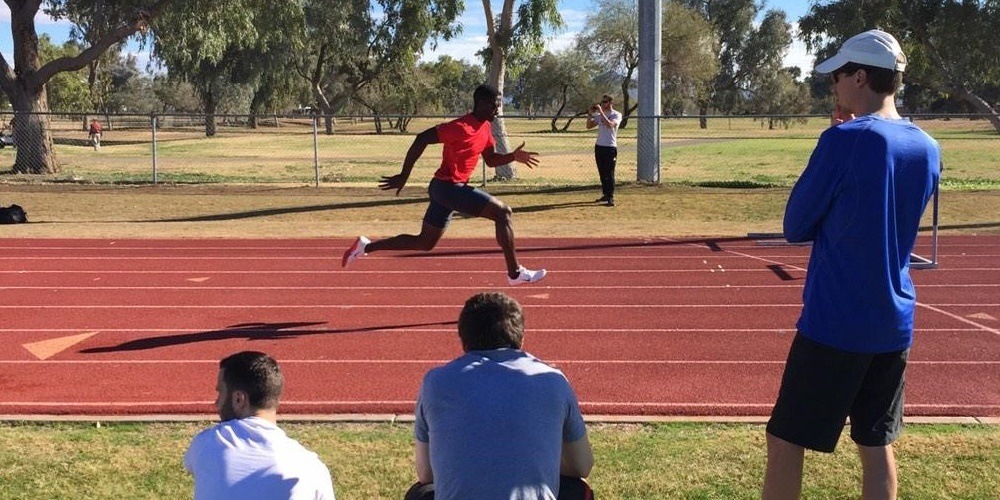Last week saw a truly global edition of the Apprentice Coach Program take place – with coaches from South Africa, Wales, Holland and the USA sharing in a week of gold standard interaction and coach education.
As always, our visiting coaches spent the first part of the day trackside, before moving onto our partner facility – EXOS – to continue their observation and interaction with athletes and coaches. This was followed daily by either the legendary poolside chat; a presentation, or both.
This time round, our presenters included David Tilbury Davis – Senior Partner at PhysFarm, who spoke on Performance Engineering: Modelling & Predicting Performance with Elite Athletes; EXOS Performance Coach – Brett Bartholomew, who presented on The Impact of Influence; and renowned strength and speed Coach – Loren Landow, who spoke on Trunk Performance.
How did it all go? We like to let the feedback we receive speak for itself – so here is what some of our visiting coaches had to say:
“Strongly recommend any coach to consider @ALTISworld ACP – a wealth of knowledge and insight openly shared”
“If you are a coach/trainer/therapist coming down to @ALTISworld it’s worth its weight in gold! I can’t wait to get back…”
“The opportunity to spend time and share ideas with new coaching friends has been unbelievable”
As always, we have shared some of the highlights of the week from our Twitter feed; starting with some of the key messages from David Tilbury Davis’ talk on Trunk Performance:
Without measuring – there is no management – what are your tools for measurement and why?
There is no perfect workout – only perfect adaptation. Find training that produces optimal adaptation for the athlete.
Coaches should understand and be able to present the biological basis and desired outcomes of all training sessions.
The goal of research is often to reduce influencing variables – life and performance have many variables…be careful.
Vo2 max measurements – how much do they inform programming? What about oxygen uptake efficiency?
“Optimize the individual not the process”
David Tilbury Davis
How does the body learn and adapt? Process and progression is key!
Performance modelling allows for critical evaluation of training ideas.
Performance modelling should be athlete specific – and “tests” must inform intelligent decisions on programming.
The “perfect taper” is INDIVIDUAL to the athlete and specific adaptation characteristics.
Performance engineering is about ACCURATELY monitoring – while making smart decisions based on the data.
Day 1 Poolside chat
Use slower speed movements in warm up or training to determine asymmetries and stabilizer issues @PfaffSC
Athletes are often scared to report injury correctly – afraid of getting behind. This is a myth @PfaffSC
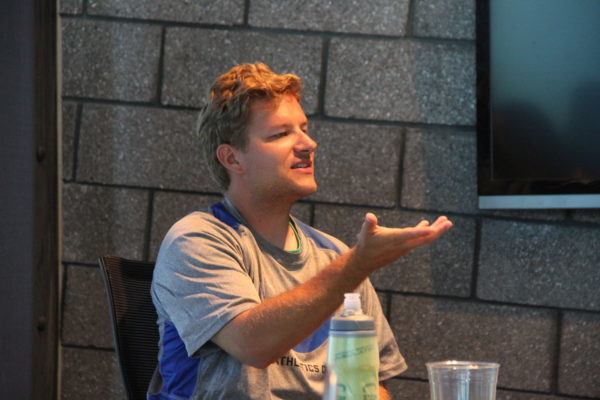
Andreas Behm
Coaches place too much value on volume and density – don’t do things just to do them. What do you NEED @PfaffSC
South Africa is fighting a volume epidemic – many weekly competitions + volume = overtraining @chrisfconradie
Why are high jumpers running 300m runs? It is 10 steps, a few times over a few hrs…Why? @PfaffSC
The “energy system training” paradigm has shifted towards getting fit, instead of getting fit for ____ @PfaffSC

Kyle Hierholzer
The importance of educating athletes on self-therapy cannot be overstated – we must give them tools to take care of body.
Drawing from nature – the lion sleeps/rests 22hr/day and hunts for 2. Sleep is important @PfaffSC
Be wary of weight room robots – teach mindfulness and purpose of training session to foster auto regulation @PfaffSC
Day 2 Poolside Chat
@KyleHierholzer – weather is a massive opportunity to observe skill stabilization.
Rhythm and sound cues often make more sense to athletes than intrinsic – technically based cues @CoachSanAndreas
We want to set up a strong skill foundation for youth athletes- what are the best skills to teach and how? @JBoele2go
Have a sound technical model – account for proper biomechanics – train fundamental components consistently @PfaffSC
Kids must have room to find a multitude of solutions to different movement skills – play! Similar for elites @PfaffSC
Learn from specialists – SWAT – they are excellent because fundamentals are drilled to near perfection @PfaffSC
“Successful athletes practice fundamentals over and over with mindfulness and purpose”
Andreas Behm
Our rule book – be a good and responsible person. No need for big team rule books @KyleHierholzer @CoachSanAndreas
Early specialization is not good – @amhurdlestar credits gymnastics training to his body awareness @CoachSanAndreas
Great point @chrisfconradie – speed and power oriented athletes should do a multitude of speed sports early on.
Must take into account athlete life situations. Homesickness is as important as diet, sleep, etc @chrisfconradie
Must be willing to either learn or admit what I don’t know – athletes always respect honesty @TilburyDavis
The core is trained via proper use of mechanics in real time sports movements. Core isolation does not transfer.
If you truly want to problem solve – you and the athlete need to be ok with experimentation @KyleHierholzer
Teach in a culture where failure is how we learn – not avoided. Should be embraced as part of process @PfaffSC
Initial failure is NOT permanent failure @CoachSanAndreas
Risk taking and team work are part of the coach athlete relationship – open communication and vulnerability are key.
We have to put athletes/people into situations where there is no choice but to find your own solutions @Chidi1Enyia
Day 3 saw Brett Bartholomew speak on The Impact of Influence
The science of coaching is well on its way – I feel the art of coaching should be emphasized a bit more.
People are the ultimate performance principle- how we interact and motivate is critical.
Biggest turnaround in college football history was @kstatesports – get the right people – they are the performance factor.
“Athlete success is not based on what we know as a coach – it’s based on what the athletes learn”
Brett Bartholomew
Are we painters or true artists as coaches? Consider athletes’ idea of training when shaping programs.
Environment has significant impact on how we create change – i.e. Darwin.
It’s our job as coaches to connect people and purpose.
Coaching – people based approach focused on environment, relationships, and communication.
We need to have a deep understanding of our athlete’s desires – which leads to belief and action.
Understanding human nature and drivers are important for many reasons.
People are generally driven by learning, bonding, acquiring, and defending.
Drives and purpose is the best performance enhancement drug.
Communication is about depth – not breadth. What is the quality of your communication and connection?
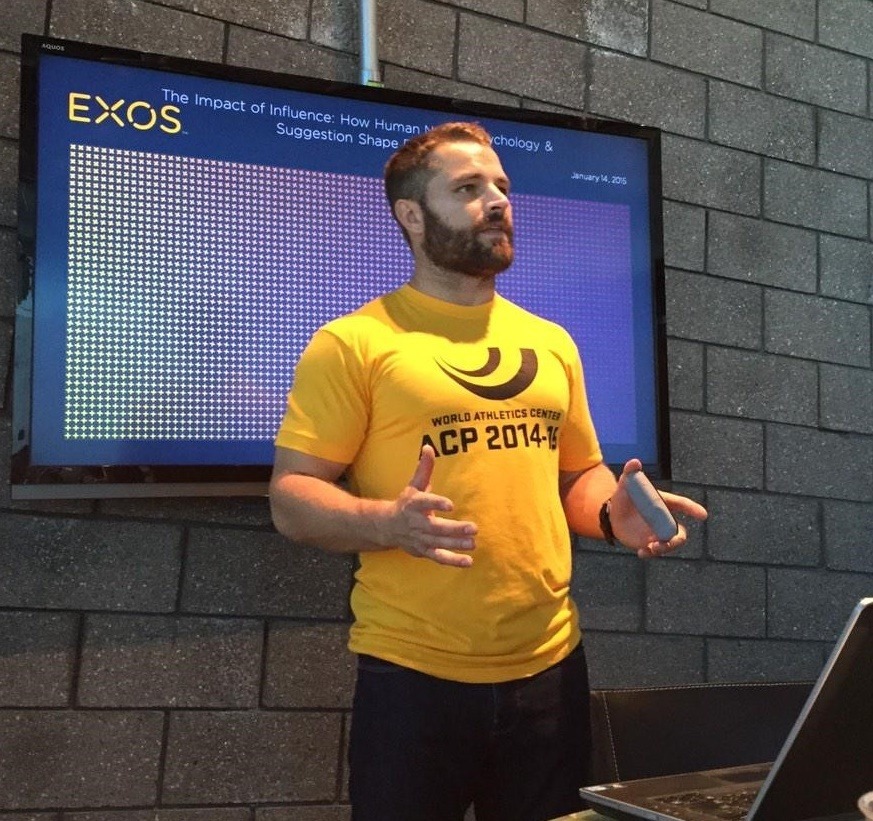
Brett Bartholomew
Positive images influence self efficacy, cognitive function, motivation.
Information is useless – the manner in which it is conveyed is critical.
Influence of color? How about a pink prison…colors can pacify.
Our industry is behind the curve – we can improve how productive and engaging our environment is.
You can afford creativity – it’s free and already inside out brain.
Allow for struggle or “reach and repeat” to find what athletes are truly capable of.
Our facilities can be refuges – not retreats – or you will get beat by this guy.
All Blacks winning percentage from 75 to 85% – attributed largely to humility.
“We and our programs are often a sense of stability for our athletes – be aware of this”
Brett Bartholomew
Fear is a fertilizer – it acts as a catalyst for growth/learning.
The opposite of fear is actually a love of learning.
Your program should be written with PEOPLE and individual personalities in mind.
The physical follows the psychological, generally not the other way around.
Sometimes the best coaching cue is simply a question.
Poolside chat
It’s not always about what you say – pay attention to what you don’t say @PfaffSC
Dynamic questions help athletes realize for themselves if they have correct technical understanding @Chidi1Enyia
Don’t underestimate the session feedback form to debrief and inform future practice @Coach_BrettB
Athletes easily skew or distort their own drivers- can self-sabotage due to lack of clarity + purpose @PfaffSC
Life is variable and levels of connecting with an athlete can change over time @Coach_BrettB
Psychological coping can be a recovery strategy in and of itself @Coach_BrettB
I ask athletes what they tell themselves when they wake up, warm up, enter the stadium on big competition days @PfaffSC
One has to educate athletes on minimum competency standards. This helps provide context and a framework for performance @PfaffSC
Positive self-talk can help rationalize improved performance for an athlete. They convince themselves that it is possible @CoachSanAndreas
Music, moods and self-talk are closely intertwined @Coach_BrettB
Music has almost replaced self-talk for newer generations. But the inner voice I still find to be most powerful @Coach_BrettB
Coaching is a sympathetic state for most of us, it is important to unplug and unwind to recharge @Coach_BrettB
I program for myself to help regenerate: breaks, running, meditation @PfaffSC

Dan Pfaff
The stronger the coaching community as a whole, the better it will be for our athletes moving forward @Coach_BrettB
Weight training is a complimentary menu item – the focal point is almost always the event itself @PfaffSC
Loading parameters, kinematics, bar velocities change from 5 reps to 2 or 1 reps of the clean @PfaffSC
The weight room is an observational screen – movement quality under different loads and speeds is important to observe @CoachSanAndreas
Movement screens have been around as long as coaches have been – it’s called watching practice with purpose @PfaffSC
“Too many coaches and athletes have been brainwashed to think they have to be absolutely crushed after the workout”
Dan Pfaff
There are different types of fatigue – muscle soreness and vomit are not good metrics of fatigue @PfaffSC
Structuring longer distance race plans can sabotage athletes – races are often chaotic – put in chaotic work/rest intervals @multisportbrain
We program exercises that help emphasize athlete’s strengths – program with the individual in mind @CoachSanAndreas @Coach_BrettB
Focusing on strengths in weight room or track leads to a confident/happy athlete @CoachSanAndreas
Is your athlete a pusher or puller? Do they enjoy pushing exercises or pulling? Observe them in weight room/ on track @CoachSanAndreas
“Communicate and cue your athletes in a way that makes sense to their movement preference”
Andreas Behm
Separating podium finishers from finalists: belief in the program, execution, belief in self-ability @PfaffSC
Endurance athletes are stuck in a metabolic mindset – there is often a gap in running mechanics and efficiency @multisportbrain
Topics of discussion when meets are going well should always be the fall back in big meets or when things go south @PfaffSC
In 3rd world countries, they often don’t play sport. They do sport to get out of poverty – this directs much of doping use @multisportbrain
Very surprised by how open and welcoming the staff and athletes here are @LorenLandow
Sometimes coaches forget that you are working with a human being not a robot- environment must foster positive relationship @chrisfconradie
Amazing to see how much progress can be made by doing fundamentals well and fostering healthy communication @LaurieJNeedham
Nobody is put on a pedestal – the athletes always come first @chrisfconradie
If coaches are honest with themselves, we make more mistakes than successes- we eat humble pie every day! @PfaffSC
“To be a part of a healthy and good network – you have to give back. Mentorship is a two way street”
Dan Pfaff
Are you sound enough in your principles and philosophy to withstand exposure? @PfaffSC
Day 4 saw Loren Landow present on Trunk Performance
I have to be willing to search for multiple solutions to a particular problem.
Patience is important in motor skill acquisition -for athletes and coaches- let skills actualize.
Understand what matters – mechanics should be understood, not explained during a training session.
Mr. Miyagi trains motor patterns without explaining the details so they can be recalled without thinking.
Watch how your athletes move putting on shoes, picking up water, etc – lots of info in basic movement.
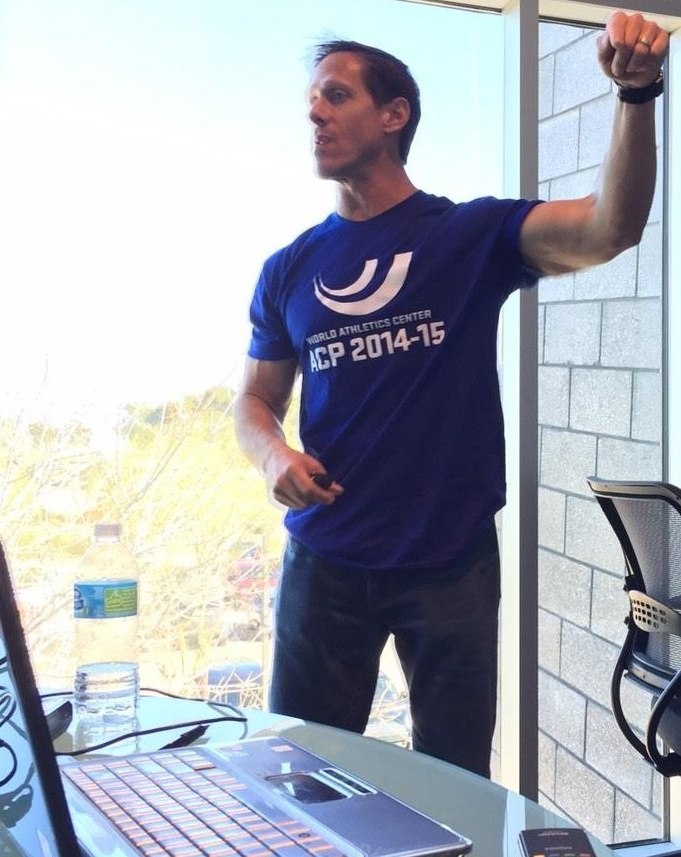
Loren Landow
We need to teach the trunk how to turn on the brakes! Eccentric strength cannot be ignored.
Without stability you can express only limited force – shooting cannon out of a canoe!
How much ROM does an athlete have before compensating? This is a highly important observational skill.
I want to see relative range of motion with control and spatial awareness.
“Athletes generally are NOT weak in the trunk – they are more likely unaware of how to use it”
Loren Landow
Small amounts of perturbations are beneficial if they stay within the safe ROM of joint structures.
Yes there is a significant amount of trunk training in Olympic lifts – cannot ignore them.
Final Poolside chats
@CoachSanAndreas “how can we make the program better?” Important to receive feedback.
Much of my apprenticeship was really just stalking coach Tom Tellez at his speaking engagements @PfaffSC
Coach @PfaffSC stories are priceless – worth the cost of #ACP alone #wisdom
So lucky to have 2 medals at my first Olympics – probably just because Eastern Europe boycotted @PfaffSC
Hard part for track coaches is working for 20 years without making money @PfaffSC relationships fuel passion.
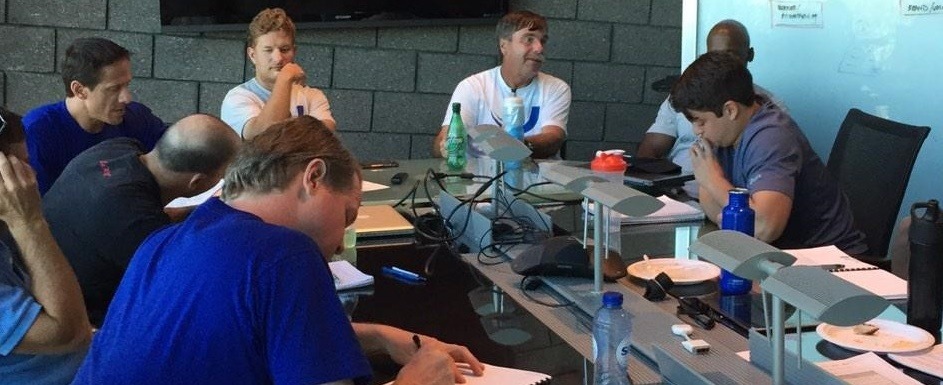
Andreas Behm
Common mistake among fight teams – lack of inter-communication and lack of true high intensity bouts @LorenLandow
Athletes self monitor and maintain quality of trunk activation exercises because they realize the value @LorenLandow
Move the program along with the athlete – don’t move the athlete along with a rigid program.
Give the athletes room to explore skills – initial failure is really just learning @MichaelBoykin_1
Many times the decision on what makes it into a training program is how well we can monitor it @PfaffSC
Until athletes have a certain level of understanding around biomechanics of the event – video is less useful @PfaffSC
Imitation can be a slippery slope – what works for one may not work for another @CoachSanAndreas
Men and women will generally have very different KPI’s – but biomechanics are biomechanics @PfaffSC
Biggest differences between coaching male/female is therapy input and communication style @PfaffSC
If I write it down on the program I am going to monitor – for distance runners, I’m on the bike next to you! @PfaffSC
For those interested in attending our ACP or PTP – you can find further information here. We look forward to welcoming you to the WAC in the near future!
